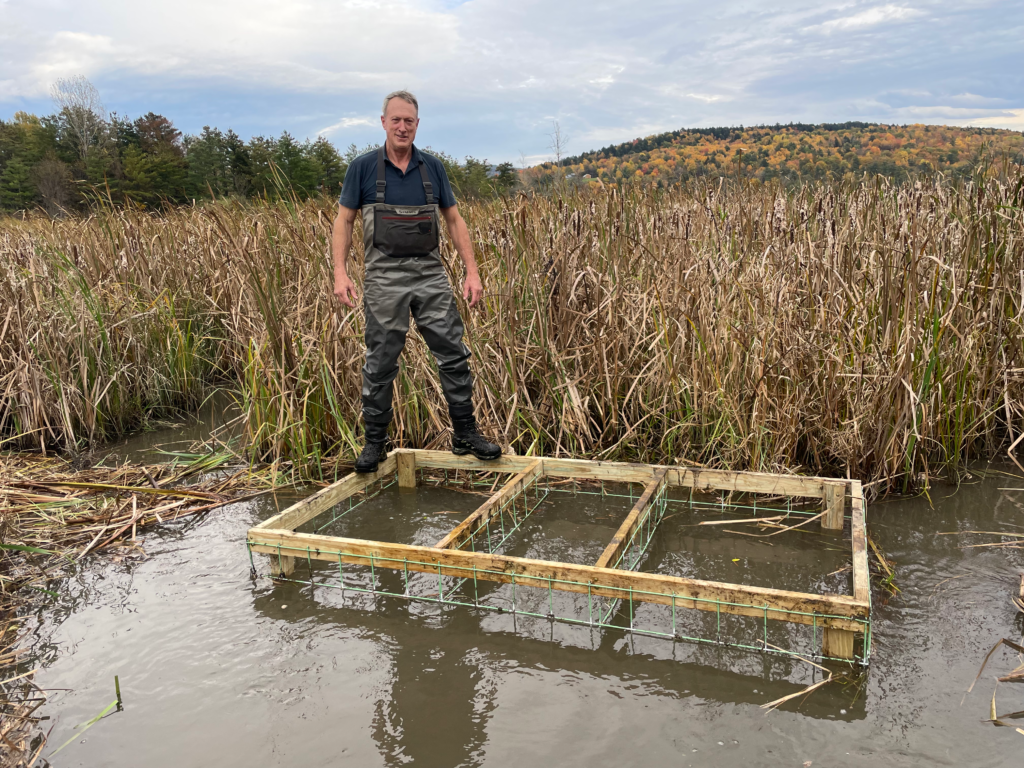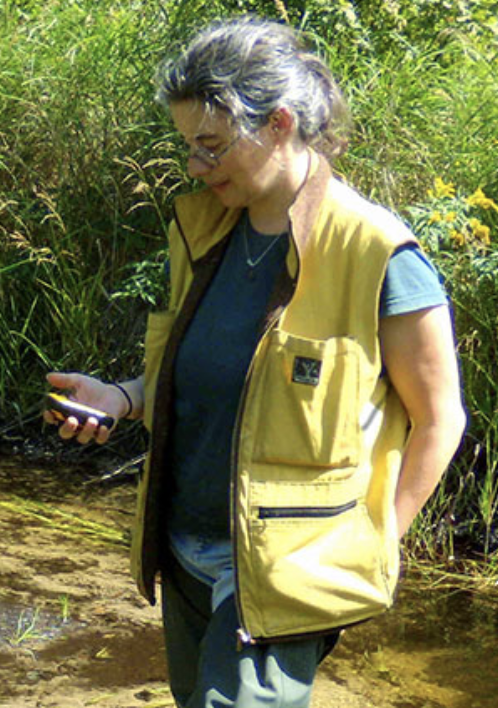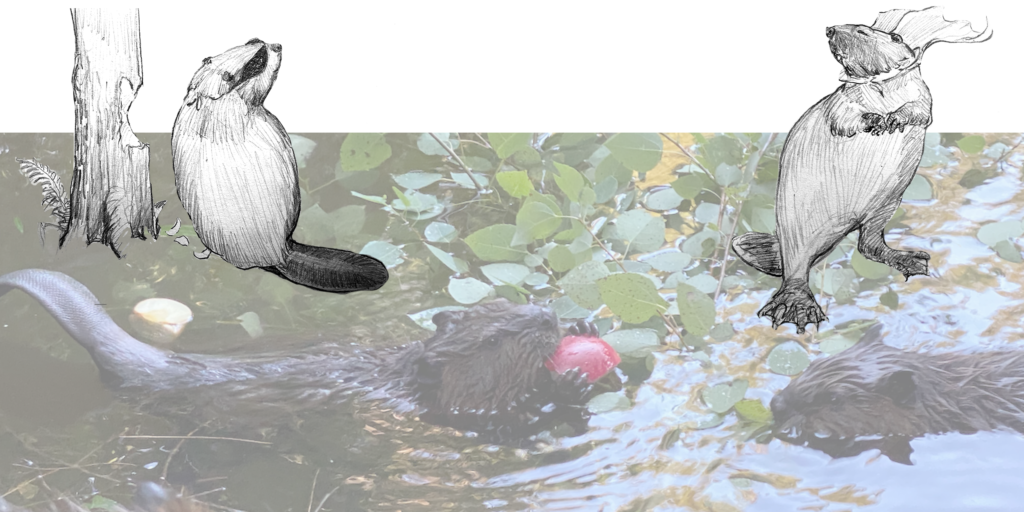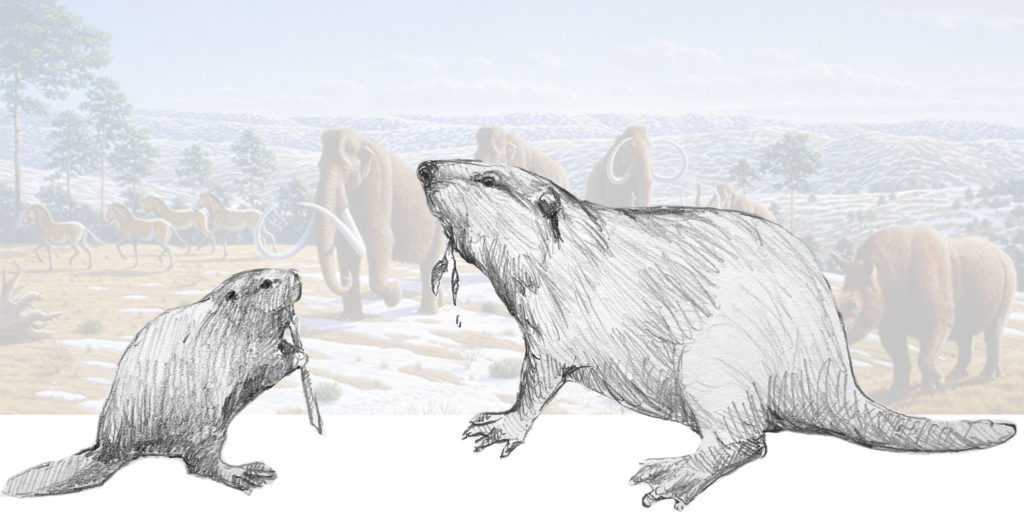BEEC is working with towns in the region to raise awareness of the ecological benefits generated by beavers and to increase the capacity for these towns to manage conflicts non-lethally, leaving beavers in place to do their good work. Read on to learn more about beavers and about upcoming events.

Beaver Camp II:
Beaver Deceiver Build
Serious fun for friends of wetlands
Tuesday, April 22 (Earth Day) and Wednesday April 23
At BEEC and beyond
Beavers build wetlands. They do it fast and they do it for free. They sometimes do it in places we don’t want them to. Here’s the good news: low tech solutions exist that can solve conflicts. Culverts can be protected, water depth can be set, valued trees can be fenced. . . . Skip Lisle has devoted his career to outsmarting beavers while keeping them in place to do their good work. He is the best in the world at what he does, and he lives in Grafton Vermont.
Spend two days learning from Skip. Find out how he analyzes a site to choose the size and shape of filters and fences. Practice working with the materials he uses in dynamic Vermont streamscapes. This workshop is being offered free of charge and will be filmed to make an instructional video. Participants must be willing to be filmed and able to participate in the build. No carpentry skills are necessary, just comfort being outdoors in a wetland.
Begin indoors at BEEC at 9:30 am with an introduction to beaver biology and conflict resolution. After lunch (provided) we will head to a conflict site to install a flow device.
Evening on Tuesday features optional activities that will take place at Skip Lisle’s Grafton property. Beavers have been on site there for fifty years and have created exceptional wetlands. Admire the wetlands, then grab picnic provisions from the Grafton Market and enjoy beaver watching and picnicking on pondside decks.
Camping options are available for participants coming from afar.
Day 2 we will meet at the field site to complete the build. Conclude the day with a Q & A at a cafe near the field site.
As a bonus, we are offering one or two participants the opportunity to work with Skip on a flow device installation at a beaver conflict site in their community after Beaver Camp, with materials and Skip’s time ( a $5,000 value) covered by a funder.
Spaces are limited. Reserve yours early!
The rain dates will be the following week, April 29 and 30.
* Beaver Camp I took place in October, 2024. It was an introduction to beaver biology, ecology, and hydrology. We explored wetlands, helped build a flow device, and learned about advocacy. We plan to do it again this fall.
BEEC and the Marlboro Beaver Working Group bring you
Rediscovering Marlboro’s Wild Waterways

Saturday, March 29 at 10 am
Marlboro Community Center
What did Marlboro’s rivers and wetlands look like before European settlement, and how can understanding the past help guide future restoration? Join Dr. Denise Burchsted, an expert in river and wetland systems, as she explores the role of beavers, log jams, and natural waterway dynamics in shaping the historic landscape of Marlboro. Using historical maps and modern data, she will reveal the lost wetlands of pre-colonial Marlboro and discuss the flood mediation and ecological benefits of more natural streams and rivers. Dr. Burchsted has mapped the town and will share her conception of what the watery world of Marlboro looked like. We hope to see you at the Community Center to travel back in time.
Why Beavers?
Beavers are builders of wetlands. As our climate heats and becomes less predictable, wetlands become even more important. Beaver ponds and wetlands hold cooling water during droughts and slow speeding water during floods.
Beavers are built for the water and they can’t live without it. That is why they are so dedicated to building dams to keep it in place. As beavers move upstream and down creating new ponds, the areas they leave behind become meadows and shrub lands. These are all important habitats for many plants and animals, from moose to mink. This makes beavers a “keystone” species—one that is essential for other species to thrive.

Guess which other species changes the landscape to suit its needs? We do! When beavers’ plans conflict with ours, they can cause us a lot of trouble. They clog culverts, cut down favorite trees, and flood fields and cropland.
Because beavers are so important, BEEC advocates for solutions to these conflicts that work for people and beavers. Along the way, we bringing you opportunities to learn more about the beavers in our midst. BEEC is working with Beaver Working Groups in three towns, Halifax, Westminster, and Marlboro.
In October, BEEC held a first weekend Beaver Camp. This was so much fun we plan to do it again. Email if you’d like to attend.
Did you know?

How Big were Ice Age Beavers?
In Ice Age Halifax, giant beavers lived among the woolly mammoths and short-faced bears, oh yes, so did modern beavers. They were aquatic, but they did not cut down trees or make dams and lodges. They weighed as much as 275 pounds and were about the size of a black bear.
Check out this Vermont Edition interview with Patti and Skip on Vermont Public!
